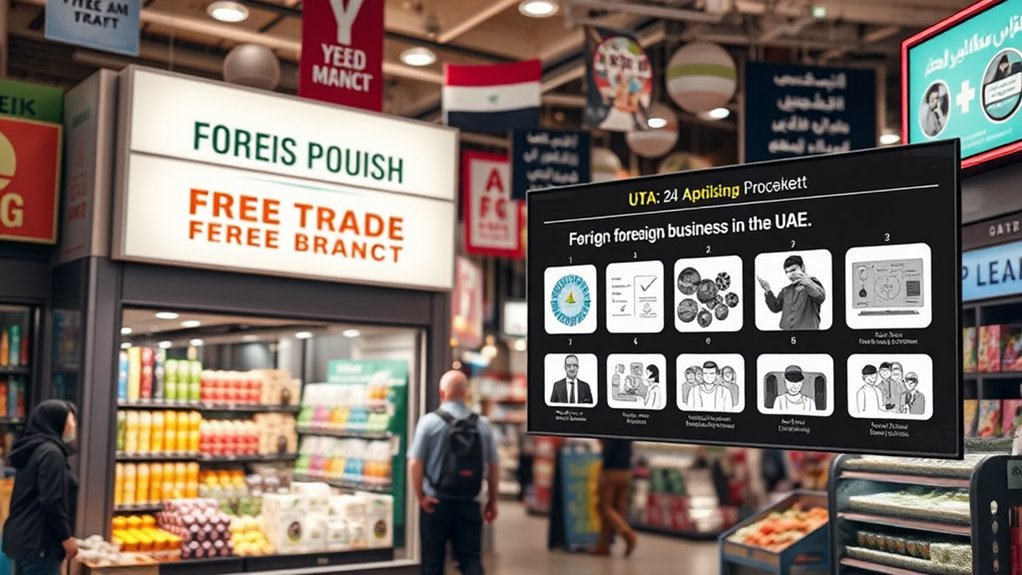Yes, a foreign branch can trade freely in the UAE market, benefitting from 100% foreign ownership and a favorable tax environment, such as the 0% corporate tax in designated free zones. This structure simplifies the establishment process and eliminates the need for a local partner, enhancing operational flexibility. However, compliance with local regulations, such as securing appropriate licenses and appointing a Local Service Agent, remains essential. Additionally, understanding the local market dynamics and consumer behavior can greatly impact your success. If you're interested in the nuanced details surrounding operational strategies, you'll find valuable insights ahead.
Overview of Foreign Branch Companies

When considering global expansion, many businesses look at foreign branch companies as a viable option. A foreign branch operates as an extension of its parent foreign company, lacking separate legal status, which allows for 100% ownership without requiring a local partner. This considerably simplifies the establishment process, particularly in the UAE. However, it's essential that the business activities of these foreign branches align with those of the parent company, ensuring compliance with local laws. Additionally, foreign branches must adhere to local licensing and tax regulations, obtaining necessary approvals from authorities such as Dubai Economy and Tourism. Establishing a foreign branch not only offers strategic access to lucrative markets in the Middle East, Africa, and South Asia but also benefits from the UAE's favorable tax environment. Furthermore, foreign branches must appoint a local service agent to facilitate their operations in compliance with UAE regulations.
Benefits of Establishing a Foreign Branch
Establishing a foreign branch in the UAE offers you unparalleled ownership control, allowing for 100% foreign investment without the need for a local partner. This setup not only opens doors to strategic markets across the Middle East, Africa, and South Asia but also provides significant tax efficiency, including a 0% corporate tax in free zones. Additionally, streamlined financial management lets you leverage your parent company's resources, enhancing operational effectiveness while ensuring compliance with local regulations. Furthermore, foreign branches benefit from a local sponsor's requirement being eliminated, allowing for greater operational flexibility compared to mainland businesses.
Full Ownership Control
By setting up a foreign branch in the UAE, you gain the advantage of 100% ownership, allowing you to maintain complete control over your operations without the complications of a local partner. This structure enables you to enjoy the benefits of foreign ownership, positioning your company to capitalize on the lucrative UAE market while retaining strategic oversight. With 100% foreign ownership, you can align your branch's activities directly with your parent company's objectives, enhancing brand consistency and operational efficiency. In addition, this arrangement facilitates simplified financial management, empowering you to leverage resources effectively. As a result, you can navigate the complexities of compliance with UAE laws while optimizing your market presence and operational strategy in a competitive landscape. Moreover, this shift in ownership regulations has significantly enhanced the attractiveness of the UAE as a foreign investment destination.
Tax Efficiency Advantages
Setting up a foreign branch in the UAE not only grants you full ownership and control but also opens the door to significant tax efficiency advantages. The UAE's tax-friendly environment, characterized by a 0% corporate tax rate in structured free zones, enhances profitability for your parent company. Additionally, the absence of personal income tax allows your employees to retain more of their earnings, further maximizing financial benefits. Although the initial investment for establishing a foreign branch ranges from AED 50,000 to AED 100,000+, the potential tax savings can substantially offset these costs. By taking advantage of the UAE's favorable tax landscape, you can strategically position your business for growth while optimizing your returns on investment. Furthermore, the 100% foreign ownership permitted in free zones provides a unique advantage that makes the UAE an attractive destination for entrepreneurs.
Streamlined Financial Management
When you establish a foreign branch, you tap into the financial resources and expertise of your parent company, which leads to streamlined financial operations and improved cost efficiencies. Foreign companies benefit from a simplified financial management structure that aligns seamlessly with the parent company's accounting systems, enhancing financial reporting and oversight. The UAE's absence of personal income tax greatly boosts financial attractiveness, facilitating greater capital retention and reinvestment opportunities. Additionally, by taking advantage of UAE free zones, foreign branches can operate under a corporate tax rate of 0%, drastically reducing tax liabilities. Maintaining full ownership and control allows for expedited decision-making processes, enabling quicker financial responses to market changes and operational needs, ultimately fostering a more agile business environment.
Step-by-Step Setup Process

Setting up a foreign branch in the UAE requires a clear understanding of several critical steps. You'll first need to appoint a Local Service Agent who will navigate the local regulatory landscape for you. Afterward, you'll move through licensing approval stages and guarantee all legal documentation is meticulously prepared to secure your trade license.
Local Service Agent Role
To successfully establish a foreign branch in the UAE, engaging a Local Service Agent (LSA) is vital. The LSA acts as your liaison with local authorities, facilitating the licensing process without holding any ownership stake. They must be either UAE nationals or companies fully owned by Emiratis, guaranteeing compliance with local regulations.
Here's a brief overview of the LSA's role:
| Role | Responsibilities | Benefits |
|---|---|---|
| Local Liaison | Navigates local authority interactions | Streamlines the setup process |
| Compliance Facilitator | Guarantees adherence to local laws | Reduces regulatory delays |
| Initial Approvals | Assists in obtaining necessary permits | Accelerates business commencement |
A reliable LSA is vital for a smooth and efficient setup of your foreign branch in the UAE.
Licensing Approval Stages
Traversing the licensing approval stages for establishing a foreign branch in the UAE involves several key steps that guarantee compliance and set the foundation for your business operations. First, you'll need to appoint a Local Service Agent (LSA) to facilitate your interactions with local authorities. Next, secure initial approval from the Dubai Economy and Tourism (DET), which serves as a preliminary endorsement of your business activities. For mainland branches, the Ministry of Economy must also grant approval, typically costing between AED 10,000 and AED 15,000. Finally, acquire a trade license from either the DET or the relevant Free Zone Authority, with fees ranging from AED 10,000 to AED 30,000. These licensing approval stages are essential for Foreign Investors aiming to thrive in the UAE market.
Legal Documentation Requirements
Before diving into the specifics of legal documentation requirements for establishing a foreign branch in the UAE, it's important to understand that thorough preparation can streamline the setup process considerably. You'll need to navigate several key steps to guarantee compliance with local regulations:
- Appoint a Local Service Agent (LSA) who will liaise with authorities.
- Obtain initial approval from the Dubai Economy and Tourism (DET) by submitting required documents and paying fees.
- Draft and notarize significant legal documentation, including the Memorandum of Association (MOA) and lease agreements, prior to securing a trade license.
Ultimately, acquiring a trade license from either the DET or the relevant Free Zone Authority is vital, with licensing fees varying based on your business activity.
Investment Considerations and Costs
When considering establishing a foreign branch in the UAE, it is important to account for various investment costs that can greatly impact your budget. The total investment typically ranges from AED 50,000 to AED 100,000+, influenced by your location and business activities.
| Expense Category | Estimated Cost (AED) |
|---|---|
| Trade Name Reservation | 620 – 2,000 |
| Initial Approval Fees | 2,000 – 5,000 |
| Ministry of Economy Approval | 10,000 – 15,000 |
| Trade License Fees | 10,000 – 30,000 |
Additionally, you must consider ongoing operational costs such as office rentals and employee salaries, as these are critical investment considerations for sustainable business operations in the UAE market.
Understanding Market Entry Requirements

To successfully enter the UAE market, you need to understand the specific licensing and permit requirements that govern foreign branches. Regulatory compliance is paramount, as it encompasses various essentials, from labor laws to sector-specific regulations that dictate your operational landscape. Additionally, market accessibility considerations will play a significant role in shaping your strategy and determining the viability of your business within this dynamic environment.
Licensing and Permits Needed
Steering through the licensing and permits required for a foreign branch to enter the UAE market is essential for a successful operation. To operate legally, you must obtain a commercial, professional, or industrial license based on your business activities. Initially, securing permission from the Dubai Economy and Tourism (DET) is important before proceeding with the licensing process. Additionally, consider these essential points:
- A Local Service Agent (LSA) is necessary for mainland branches.
- Specific licenses from the Ministry of Economy may be required.
- Licensing costs range from AED 10,000 to AED 15,000.
Moreover, adherence to local regulations, including labor laws and sector-specific requirements, is paramount for maintaining operational legitimacy in the UAE market.
Regulatory Compliance Essentials
Regulatory compliance is a cornerstone of successfully entering the UAE market. To navigate the complexities of this landscape, you must adhere to the UAE Commercial Companies Law and secure necessary licenses from authorities like Dubai Economy and Tourism (DET) and the Ministry of Economy. Furthermore, appointing a Local Service Agent (LSA) is essential for effective mainland operations. Understanding local labor laws is equally important, as these dictate employer and employee rights within the UAE.
| Compliance Aspect | Details |
|---|---|
| Legal Framework | UAE Commercial Companies Law |
| Licensing Authorities | Dubai Economy and Tourism, Ministry of Economy |
| Role of LSA | Navigate regulatory landscape |
| Business Scope | Must align with parent company's activities |
| Labor Regulations | Outline rights and obligations of employees |
Market Accessibility Considerations
Understanding the market accessibility considerations is vital for foreign branches looking to trade in the UAE. You must navigate specific entry requirements to operate legally and effectively. Begin by obtaining the necessary licenses and permits from relevant authorities, including the Dubai Department of Economic Development (DED) and the Ministry of Economy.
- Make certain your business activities align with those of your parent company.
- Be prepared for initial approval fees ranging from AED 2,000 to AED 5,000.
- Appoint a Local Service Agent (LSA) for mainland operations to facilitate compliance with local regulations.
Additionally, a thorough understanding of local labor laws is essential to managing your workforce within the UAE market effectively. Compliance will lead to successful operations for your foreign company.
Researching the Regulatory Framework
When entering the UAE market, it's vital to navigate the local regulatory framework effectively. Foreign branches must guarantee regulatory compliance by adhering to the local laws and securing necessary licenses from the Dubai Department of Economic Development (DED). Depending on whether you operate in the mainland or a free zone, licensing requirements will differ markedly. For mainland branches, employing a local service agent (LSA) is mandatory. Engaging in trade activities necessitates specific licenses, such as commercial or professional licenses. Additionally, it's important to understand customs regulations, especially concerning imported goods, and to remain informed about tax obligations, including VAT and impending corporate tax regulations set to take effect in 2025.
Market Analysis and Feasibility Study

Entering the UAE market requires a thorough market analysis and feasibility study to gauge your potential for success. This examination is essential for understanding the intricacies of this dynamic environment.
- Assess target market size and growth potential.
- Identify competitors and their market strategies.
- Evaluate consumer behavior and preferences.
A detailed market analysis enables you to navigate local laws, secure necessary permits, and comply with the UAE Commercial Companies Law. Additionally, a feasibility study helps you understand customs and trade regulations specific to either mainland or free zone operations, as well as local labor laws. By conducting these studies, you're better equipped to make informed decisions and develop strategies that align with the unique opportunities and challenges of the UAE market.
Business Plan Development
When developing your business plan for entering the UAE market, it's essential to establish clear objectives and a compelling mission statement that will guide your operations. Additionally, your marketing strategy must be meticulously crafted to resonate with the diverse consumer base, ensuring effective engagement and penetration into this vibrant market. By focusing on these elements, you lay a strong foundation for your foreign branch to thrive in a competitive landscape.
Objectives and Mission Statement
Clarity in your mission statement is essential for guiding your foreign branch's operations in the competitive UAE market. A well-defined mission articulates your purpose, aligning your team's efforts towards common objectives. To enhance your strategic focus, consider these key elements:
- Establish measurable objectives, such as achieving a specific market share within three years.
- Address unique regulatory requirements to guarantee compliance with local laws and necessary licenses.
- Develop a strategy for building local partnerships to enhance credibility and market access.
Incorporating these aspects into your mission statement and objectives will provide a robust framework for traversing the complexities of the UAE market, assuring your foreign branch's successful entry and sustainable growth in this dynamic economic environment.
Marketing Strategy Overview
Developing a marketing strategy is essential for your foreign branch to thrive in the UAE market, as it allows you to effectively connect with a diverse customer base. Start by identifying specific target market segments within the UAE's multicultural landscape, leveraging the substantial expatriate community. Utilize digital channels, particularly social media and online advertising, to maximize your reach, given the region's impressive internet penetration rate. Incorporating local cultural elements will enhance your campaigns, improving relatability and fostering customer loyalty. Additionally, establish partnerships with local influencers and businesses to elevate your brand's visibility and credibility. Finally, continuously monitor competitor strategies and consumer behavior to adapt your marketing tactics, ensuring they remain aligned with current trends and preferences in the market.
Establishing Local Partnerships

Establishing local partnerships is essential for foreign branches aiming to succeed in the UAE market, as these alliances help you navigate the complex regulatory landscape. By collaborating with local partners, you gain invaluable insights into market dynamics, consumer behavior, and cultural preferences, which enhance your foreign branch's capacity for effective market penetration.
Consider the advantages of forming local partnerships:
- Access to established distribution networks: Collaborating with local firms can streamline your entry into the market.
- Understanding cultural nuances: Local partners can guide your marketing strategies to resonate more effectively with consumers.
- Networking opportunities: Engaging with industry associations and attending trade fairs can reveal potential partners.
These strategic alliances ultimately drive growth and expansion in the UAE market.
Office Setup in Free Zones
When setting up an office in UAE free zones, you'll find a variety of options tailored to your business needs. You can choose between fully or partially furnished spaces, and utilities are activated only after securing the necessary licenses. High-speed wireless internet, data network services, and IP Telephony enhance operational efficiency in these environments. If you plan to open a branch within a free zone, consider the available co-working spaces, which offer flexibility without long-term leases. However, remember that free zone companies are generally restricted from conducting business directly on the UAE mainland, necessitating a local service agent for such activities. Additionally, full-time IT support is readily available to facilitate smooth operations.
Conducting Foreign Trade

Successfully conducting foreign trade in the UAE requires a solid understanding of customs regulations and compliance obligations. For foreign branches, grasping the nuances of both mainland and free zone regulations is vital, as customs laws differ markedly. Here are key considerations you should keep in mind:
- Obtain an importer code to facilitate lawful trade operations.
- Be aware of prohibited merchandise, such as flammable goods and narcotics, to avoid legal penalties.
- Guarantee timely arrival of goods and adherence to customs procedures to maintain compliance.
Government Interactions
Maneuvering government interactions is essential for foreign branches operating in the UAE, as compliance with local regulations can greatly impact your business success. To thrive, you must navigate specific procedures mandated by the Department of Economic Development (DED) for licensing and operations. Before commencing business activities, mainland branches need to secure initial permissions, ensuring alignment with UAE laws. Licensing requirements differ across emirates and free zones, making it vital to understand local regulations thoroughly. Additionally, your business must adhere to ongoing compliance mandates, which may entail regular submissions and updates on activities. Establishing a relationship with a Local Service Agent (LSA) is important, as they facilitate interactions with UAE authorities, streamlining processes without assuming ownership or management of your business.
Legal Compliance

To thrive in the UAE market, foreign branches must prioritize legal compliance with local laws and regulations. This commitment not only guarantees smooth operations but also mitigates risks associated with non-compliance.
- Obtain necessary licenses from authorities like Dubai Economy and Tourism (DET).
- Adhere to the UAE Commercial Companies Law, which outlines operational guidelines.
- Comply with specific sector regulations tailored to your business activities.
Navigating the complexities of legal compliance is essential for foreign branches, as it encompasses obtaining an importer code for trade and adhering to customs regulations. Non-compliance can result in significant penalties, including fines or even suspension of operations. As a result, thorough research and meticulous adherence to legal standards are crucial for successful market engagement.
Economic Environment of the UAE
While traversing the UAE market, understanding its economic environment is essential for foreign branches looking to thrive. The UAE boasts a highly diversified economy, with tourism, trade, finance, and oil contributing over 80% to its GDP, which exceeds USD 307 billion annually. Numerous free trade zones foster foreign investment, offering tax exemptions and 100% foreign ownership, thereby enhancing operational flexibility. The stability of the UAE dirham, pegged to the US dollar, further supports economic confidence and trade. Additionally, recent regulatory reforms have greatly eased the business landscape, making it more attractive for foreign enterprises. The government's Vision 2021 focuses on economic diversification, aiming to reduce oil dependency while promoting innovation and infrastructure development to attract foreign direct investment.
Jurisdiction and Licensing Requirements

Understanding the jurisdiction and licensing requirements is key for foreign branches aiming to trade in the UAE market. To operate legally, you must secure a commercial, professional, or industrial license and submit necessary documents, such as board resolutions and incorporation papers. The licensing process varies by jurisdiction:
- Mainland branches require a Local Service Agent (LSA) for regulatory navigation.
- Free zone branches allow 100% foreign ownership and offer tax exemptions but come with restrictions on mainland operations.
- Initial approvals from the Dubai Economy and Tourism (DET) and possibly the Ministry of Economy are essential.
Regular license renewals are mandatory, and adherence to UAE laws, including labor regulations, is vital to maintaining operational legitimacy within this complex jurisdiction.
Strategic Opportunities for Branches
Establishing a foreign branch in the UAE opens up a wealth of strategic opportunities that can greatly benefit your business. By leveraging the UAE's strategic location, you gain unparalleled market access to the lucrative markets of the Middle East, Africa, and South Asia. This positioning not only enhances your expansion potential but also allows for the retention of full ownership and control under your parent company, ensuring consistent branding and operational strategies. In addition, the UAE's tax-friendly environment, including the prospect of 0% corporate tax in structured free zones, greatly enhances your profitability and competitiveness. Utilizing your parent company's resources simplifies financial management, fostering operational efficiency and allowing you to concentrate on strategic growth within this dynamic market.
Frequently Asked Questions
Can a Free Zone Company Trade in the UAE?
Yes, a free zone company can trade in the UAE, but you need to understand the trading regulations. You'll enjoy free zone advantages like duty-free imports, yet must comply with specific licensing and customs requirements.
What Are the Rules for Foreign Exchange in the UAE?
In the UAE, you need to follow foreign exchange regulations and currency trading rules set by the Central Bank. This includes reporting significant transactions and adhering to anti-money laundering laws for compliance and stability.
Does the UAE Have Any Trade Restrictions?
Steering through UAE's trade policies is like walking a tightrope; you must balance compliance with import regulations. Certain goods face restrictions, and failure to adhere can lead to hefty fines or confiscation of your products.
Is UAE a Free Trade Zone?
Yes, the UAE features numerous free trade zones, offering significant economic benefits like 100% foreign ownership and tax exemptions. You'll find streamlined processes that simplify setting up and conducting business within these zones.
Conclusion
To summarize, establishing a foreign branch in the UAE offers significant advantages, yet it demands careful navigation of legal and market entry requirements. With a burgeoning economic landscape, can you afford to miss out on the strategic opportunities that await? By understanding the intricacies of compliance and market dynamics, you position your business for success in a competitive environment. Embrace the potential of the UAE market, and make certain that your branch operates within the parameters of local regulations.








